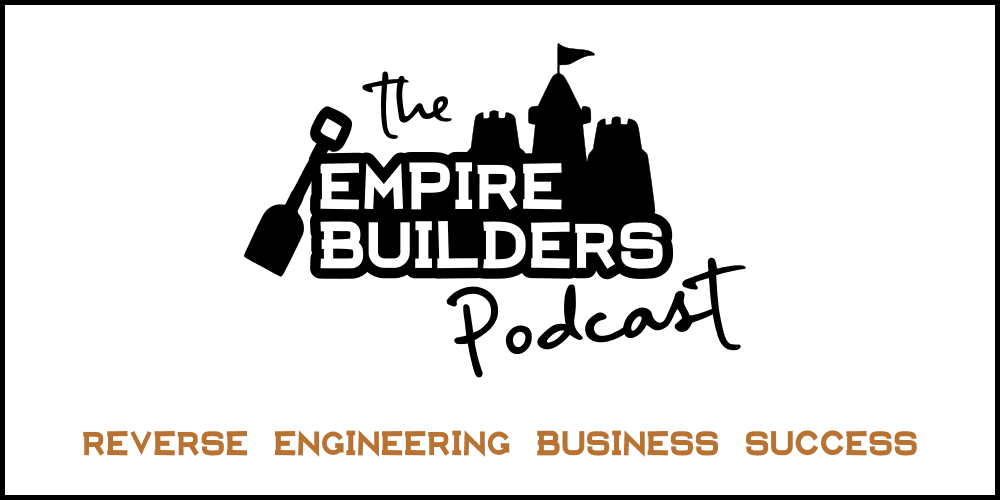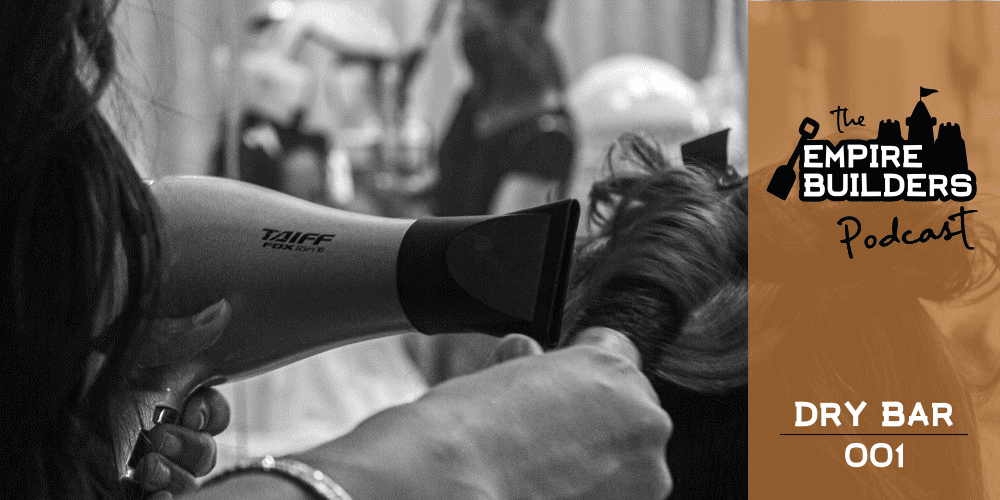Banana Republic was founded by 2 journalists with the dream to make a little extra money so they could travel. Little did they know they would create a fashion juggernaut that they sold to the GAP for hundreds of millions.
David Young:
Welcome to the “Empire Builders” podcast, teaching business owners the not-so-secret techniques that took famous businesses from mom-and-pop to major brands. Stephen Semple is a marketing consultant story collector and storyteller. I’m Stephen’s sidekick and business partner, Dave Young. Before we get into today’s episode, a word from our sponsor, which is, well, it’s us. But we’re highlighting ads we’ve written and produced for our clients. So here’s one of those.
[Tapper Jewelry Ad]
David Young:
Stephen, we’re going to take a trip south to the Banana Republic?
Banana Republic. Yeah, we’re going to go back to before Banana Republic was owned by the Gap, so in ’83.
David Young:
Yeah, I was going to say back when: back when they had really wacky stores in the malls, it had fiberglass Jeeps out in front, and I remember those stores. I thought they were so cool.
Stephen Semple:
They were cool. The thing is, when a company like the Gap comes along and says, “Here’s a check. We want to buy you,” you’ve done well. But it was founded by a couple: Mel and Patrick Ziegler in 1978. And they were not fashionistas. They did not come with a clothing background. They weren’t marketers. In fact, they were journalists, and they were journalists who liked to travel and wanted to make more money. And Mel basically had returned from Australia, and he had found these clothes that he liked the looks of: cargo pants and shirts with lots of pockets and all this other stuff. And he thought it was pretty cool. And fortunately, it was in the 1970s when fashion sense was not great, but that $1,500, that was their entire life savings.
Stephen Semple:
So they took their entire life savings, they went down to an army surplus store, bought up a pile of this crap for a couple of bucks each, and decided they were going to go to the flea market and they’re going to sell it for five bucks. So they bought things [crosstalk 00:02:54], maybe double their money. So off they go to the flea market, didn’t sell. So now, they’re sitting there going, “Wait a minute. We just spent our life savings on it, and we took it to a flea market and it wouldn’t sell.” So they decided that they were going to give another stab at it. So they repackaged it. They decided to rename the stuff. They repackaged it, “Safari clothing.” So they were actually the ones who created this idea of “Safari clothing.” They changed some of the buttons and put some patches on it and gave it a little bit more of a safari change to it, but let me ask you this, Dave. You’re selling stuff at a flea market, couldn’t sell it for $5. What do you think most people would do with the price?
David Young:
Well, most people would lower the price because they figured nobody wanted it at that price.
Stephen Semple:
Right, because also, people shopping at a flea market are what?
David Young:
Thrifty.
Stephen Semple:
Right. They’re bargain hunters, they’re cheap. Let’s put it right out there: they’re cheap. You don’t go to a flea market looking for a Rolex. You go to a flea market looking for a cheap-ass watch, right?
David Young:
Right.
Stephen Semple:
They doubled the price. So they said, “No, no. We’re selling this for 10 bucks. We’re going to sell this for 10 bucks.” Sold out.
David Young:
It’s the power of a story, isn’t it?
Stephen Semple:
The power of the story-
David Young:
The story is one word: safari.
Stephen Semple:
Safari clothing, $10, sold out. And then, lo and behold, they started in ’78 and ’83. They’re now getting the big check from the Gap saying, “Here you go.”
David Young:
Stay tuned. We’re going to wrap up this story and tell you how to apply this lesson to your business right after this.
[EMPIRE BUILDERS AD]
Brought to you by the least-full-of-shit marketers association of America. Yes, that’s a low bar, but we clear it mightily. We’re also the largest pay-per-performance branding group in North America, and that part’s for reals. If you’re looking for advertising advice geared towards local owner-operated companies, this is your podcast. And now, you can pick the brains of these advertising geniuses over lunch without having to pay for lunch or even leave your office. We’re talking 90 minutes of straight answers to all your burning questions about lead generation, customer acquisition, mass media branding, how to get off the paper crack treadmill, anything you want. And the only coin required is Candor because we can’t give no bullshit advice without basing it off no BS data on your company, competitive landscape, operations, and all that jazz. We send you a presumed questionnaire. You fill it out, candidly, and boom.
Bob’s your uncle, you’re in like Flynn, and we’ll be frank as fuck in giving you the straight scoop on all the advertising and business growth questions you always wanted to know but were too afraid to ask. You’ll also get our no-pitching and no-bitching guaranteed. No pitching means we won’t pitch you or try to sell you in any way. If you want more after 90 minutes, you’ll have to ask. And no-bitching means if you don’t think the meeting was worth your 90 minutes, we’ll send you a hundred bucks. Consider it us picking up the tab for lunch and putting our money where our mouth is. Sound like a not-so-full-of-shit offer? Well, that is what we’re known for. Take us up on it at theempirebuilderspodcast.com.
David Young:
Let’s pick up our story where we left off and trust me, you haven’t missed a thing.
Stephen Semple:
They’re now getting the big check from the Gap saying, “Here you go.”
David Young:
It’s amazing.
Stephen Semple:
I said that was five years. It took them, basically, in five years. It was so successful. It grew so quickly, along came the gap saying, “We want your store.”
David Young:
The nugget that launched that into a major brand, big enough for the Gap to buy, happened fairly quickly. And that brand is still around, but it’s nothing like it was in the early ’80s.
Stephen Semple:
Not at all. No, they’ve lost it. They’ve definitely lost their way. The stores are not funky. Look, Gap is struggling.
David Young:
It’s a Gap with a different label on it.
Stephen Semple:
Yeah. It’s a Gap with a different label on it. But for longest time, Banana Republic was the most successful part of the Gap, the Gap brains. But the message here is there’s two elements to this. And element number one is the story and the repackaging making it interesting, but don’t be afraid to increase your prices. It’s amazing. And we’ll go through other stories in the future where one of the success factors was frankly, charging a higher price: charging a higher price made it feel more special. Calling it “safari clothing” made it feel more special.
David Young:
The thing is, when you call it “safari clothing,” all of a sudden, the expected price goes up.
Stephen Semple:
Right.
David Young:
Right. “Oh, this isn’t surplus army clothing. This is safari clothing.”
Stephen Semple:
And I’d probably spend 30 bucks somewhere else for safari clothing, so deal at a flea market, right?
David Young:
Yeah, exactly. Raising your prices, it can be a really good business strategy. But you have to wrap some elements into it to justify it and make that perceived price go up because that’s really the trick, right? Just doubling the price, I don’t think would have done it.
Stephen Semple:
No, it was the combination of the two. But I’m also going to say that I think even if they had just done the repackaging without increasing the price, I don’t think it would have done that. I actually think it was the combination of the two. In a very short period of time, they became very wealthy and suddenly had the money to do what it is that they wanted to do, which was traveling the world.
David Young:
Yeah, awesome story.
David Young:
Thanks for listening to the podcast. Please share us, subscribe on your favorite podcast app, and leave us a big fat, juicy, five-star rating and review at Apple Podcasts. And if you’d like to schedule your own 90-minute Empire-building session, you can do it at empirebuildingprogram.com.






